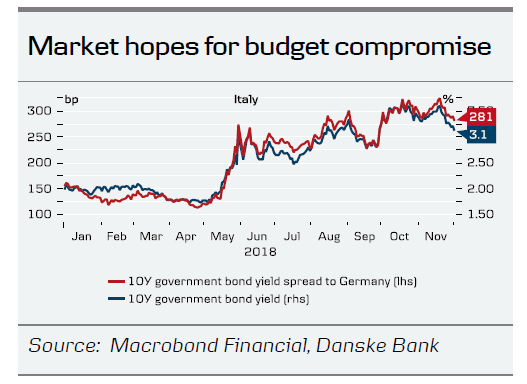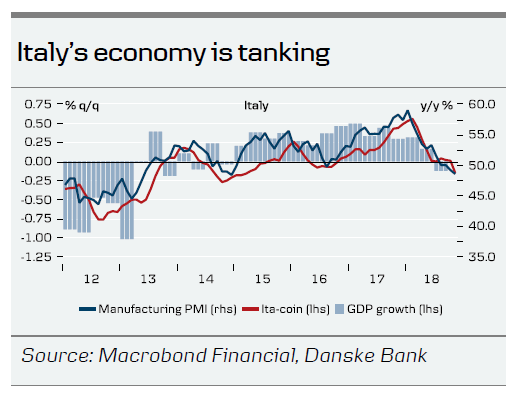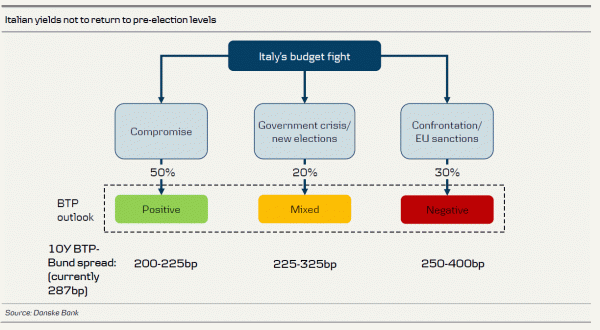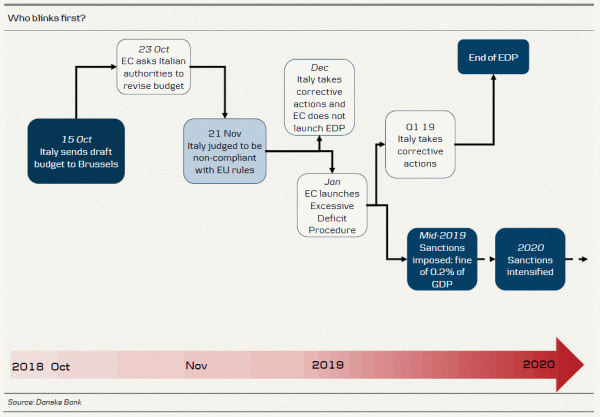Pressure is mounting on the Italian government to resolve its budget feud with the European Commission (EC), with the economy already contracting in Q3 and shifting public sentiment (a poll showed 68% of Italians in favour of budget adjustments to avoid a clash with the Commission). Over the past few days we have already seen a shift in tone from the Italian officials and Italian government bonds rallied on news that the government is considering lowering its 2019 deficit target to 2-2.2% from currently 2.4% of GDP. So are Italians blinking in the staring contest with the market and the EU?
At the time of writing, negotiations between Brussels and Rome are still ongoing, but there are a couple of reasons why we think it is too early to declare the Italian budget crisis over just yet. There remains a significant spending gap to bridge, but both Di Maio and Salvini remain unwilling to scale back their respective flagship policies. The EU is rumoured to have asked for budget cuts totalling EUR12bn (0.7% of GDP), but the Italian leaders have ruled out a deficit level below 2%. As a compromise, some officials have also talked about delaying some of the policy measures (pension reform, citizen income) to mid- 2019, which could save some EUR4-5bn in the budget. However, we think such mere accounting trickery is unlikely to sway the Commission from eventually opening an excessive deficit procedure (EDP). Both EC’s Oettinger and Dombrovskis have over the past few days stressed that ‘substantial corrections’ are needed. While the sky for a budget compromise has brightened as of late – not least because the government seems keen to avoid an EDP – it would in our view require credible commitments and more substantial concessions from Italy than the ones currently discussed (i.e. on pension reform).
That means, we also still see a relatively high likelihood of further confrontation and a formal EDP launched possibly in January 2019. However, we expect the Commission to remain reactive rather than proactive i.e. awaiting the final outcome of the current negotiations before making any definite steps towards formally starting the EDP, not least to avoid stoking eurosceptic sentiment ahead of European parliament elections in May 2019. Once under an EDP, we think it is not unlikely that the Commission will actually impose (non-zero) fines on Italy in case of repeated non-compliance, but we are unlikely to reach that stage before mid-2019 earliest.
The pressure to reach a solution to the budget feud has clearly increased, with signs of the tanking Italian economy becoming more abundant by the day: GDP contracted by 0.1% q/q in Q3, while both manufacturing PMI and consumer confidence edged down further in November. The government is looking for 1.2% growth this year. To reach that goal, the economy would need to grow 0.7% q/q in Q4, but all recent data shows such a growth spurt – which happened only once in the last decade – is unlikely to materialise. There is still a risk that the repercussions of the budget fight trigger a recession in Italy in 2019 with adverse consequences on the debt dynamics, credit ratings and market sentiment. As long as the stand-off with the EU remains unresolved, we expected Italian yields to remain choppy. However, unless the confrontation intensifies, we see scope for further performance in Italian government bonds near-term, with the 10Y spread gradually falling below 250bp (see scenarios below), but staying above levels observed before the election




